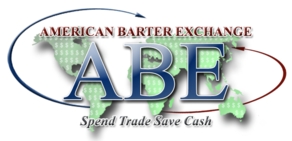Barter is a type of transaction between two or more parties in which goods or services are traded without the use of cash as a medium for transfer.
Bartering in an organized barter exchange involves the use of a trade credit or barter dollar in the transaction enabling parties to obtain the goods or services that they desire without having to provide the exact good or service desired by the other party.
From Wikipedia:
A trade or barter exchange is a commercial organization that provides a trading platform and bookkeeping system for its members or clients. The member companies buy and sell products and services to each other using an internal currency known as barter or trade dollars. Modern barter and trade has evolved considerably to become an effective method of increasing sales, conserving cash, moving inventory, and making use of excess production capacity for businesses around the world. Businesses in a barter earn trade credits (instead of cash) that are deposited into their account. They then have the ability to purchase goods and services from other members utilizing their trade credits â€" they are not obligated to purchase from who they sold to, and vice-versa. The exchange plays an important role because they provide the record-keeping, brokering expertise and monthly statements to each member. Commercial exchanges make money by charging a commission on each transaction either all on the buy side, all on the sell side, or a combination of both. Transaction fees typically run between 8 and 15%. (cited from Wikipedia http://en.wikipedia.org/wiki/Barter)
Implementing barter into your everyday business practice has become a necessity to grab your share of the revenue from this enormous business potential. Learn the fundamentals of barter but, more importantly, expand your creativity and implement these new ideas to generate profits.
